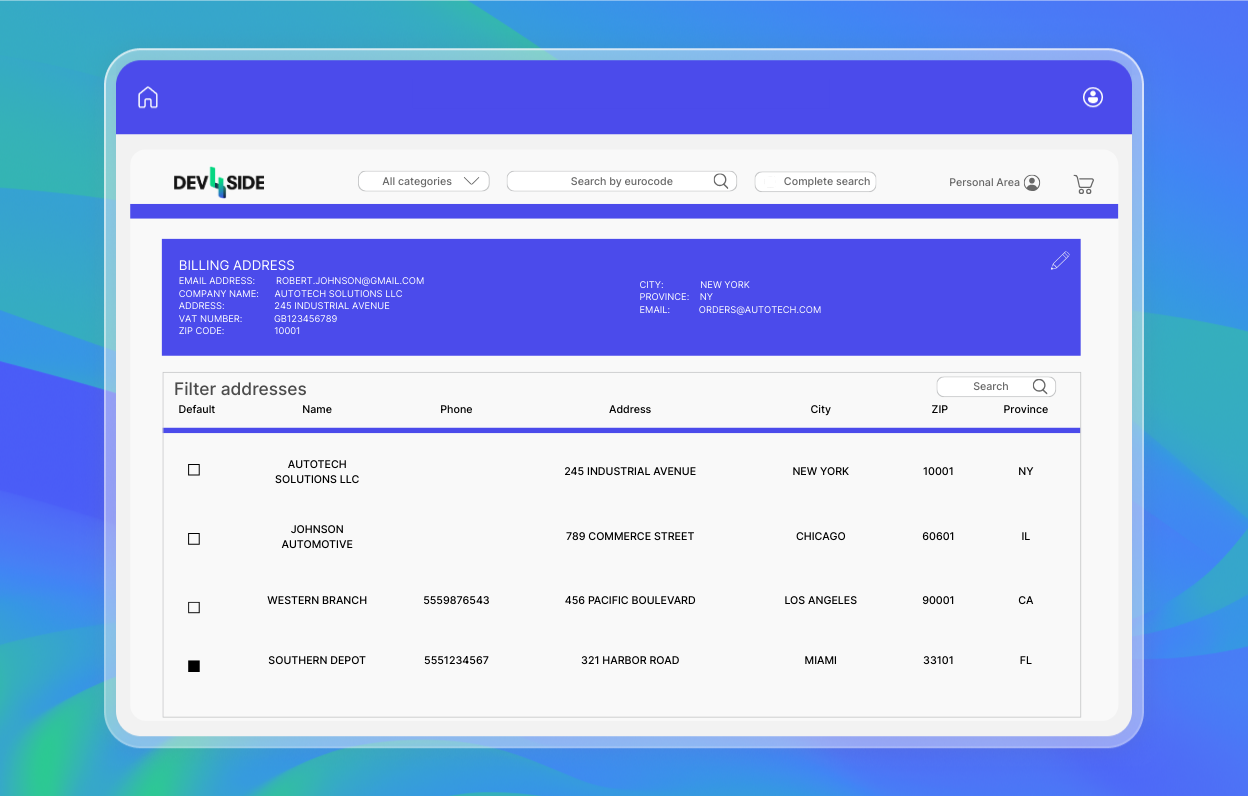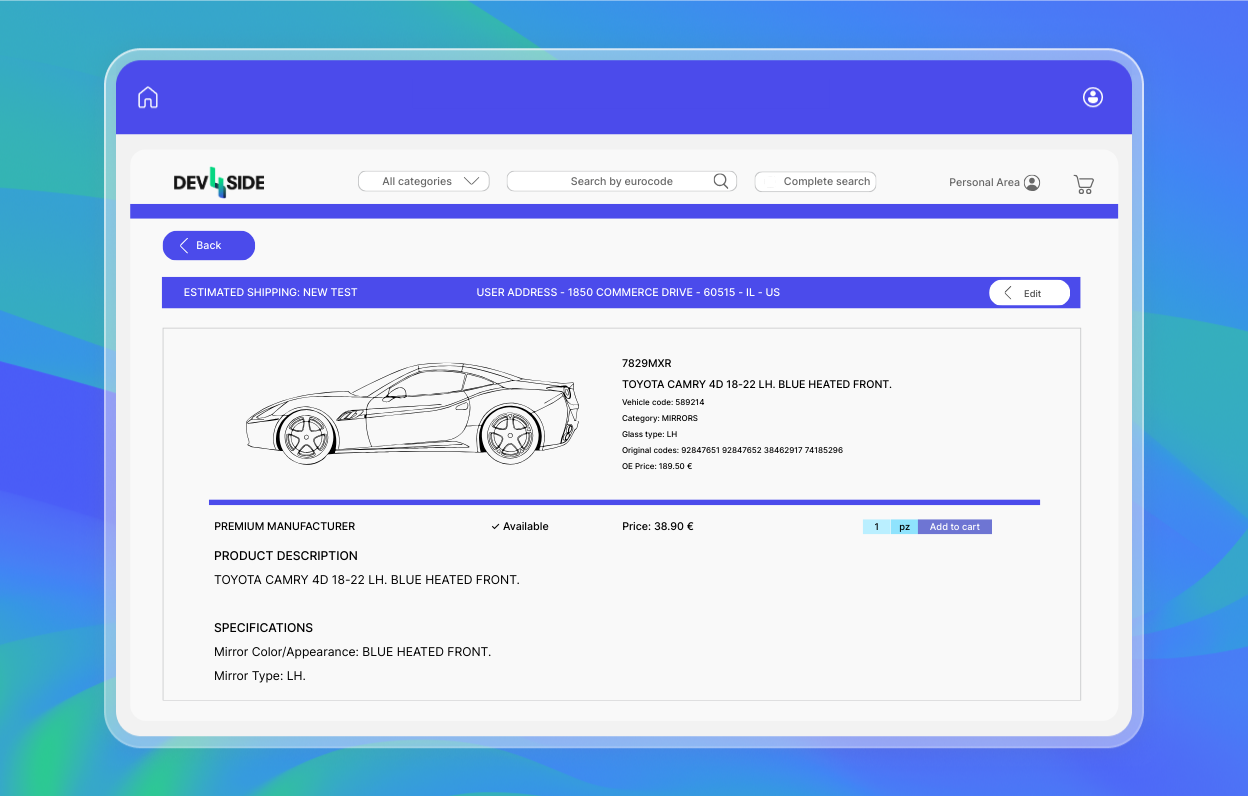The digitalization of B2B commerce in the automotive sector requires robust platforms capable of managing high volumes of transactions and complex catalogs. When it comes to auto parts, the challenge becomes even more complex: thousands of references, specific compatibility for each model, professional customers who need immediate answers. In this context, a leading company in the resale of auto parts, specialized in the supply of glass for the B2B market, asked us to transform its traditional sales model into a modern and scalable e-commerce platform.

When this leading company in the resale of B2B auto parts, specialized in the glass segment, approached us, the challenge was clear: develop an e-commerce platform to manage online sales to authorized customers and centers.
The company managed a widespread network of business customers distributed throughout the country, but the absence of a digital platform was becoming an obvious limit for business growth.
At the core of the customer's IT infrastructure was Microsoft Dynamics NAV, the ERP that had been orchestrating all business processes for years. Integration with NAV was therefore not an option, but a necessity. The new e-commerce platform had to communicate perfectly with the existing ERP, synchronizing prices, availability, orders and customer information in real time.
The customer's needs went far beyond simple online sales. First of all, a complete integration with Microsoft Dynamics NAV, already in use for the management of products, orders, customers and returns, was needed.
A particularly important aspect was the management of communications: with warehouses distributed throughout the territory, it was essential to be able to target news and content for customers based on their reference warehouse.

From an architectural point of view, the customer wanted a reusable development. The request was to build everything through a microservice that could be consumed not only by e-commerce, but also by other future clients.
Finally, given the nature of the business, an advanced search system was needed that would allow both step-by-step navigation through the various parameters of the vehicle, and direct search using a license plate or chassis number.
The answer we developed was a custom e-commerce solution based on a microservice architecture that communicates perfectly with existing NAV servers.
We chose to manage the entire platform within the Umbraco CMS, a choice that proved to be successful. In fact, through the Umbraco backoffice, the customer can manage all content, from news to communications, in complete autonomy. Each territorial warehouse can have its own specific communications, and customers automatically see only the content relevant to their reference area.
To ensure optimal performance, we have inserted a caching layer with Redis. This technical choice ensures fast response times even during the most intense traffic peaks.
The search system that we have implemented offers two modes: on the one hand, it guides the user through an intuitive path where they can progressively select the brand, model, year and type of glass needed. On the other hand, the search by license plate or chassis automatically identifies the vehicle and immediately offers compatible spare parts.

During development, we faced a particularly complex technical challenge: retrieving and aligning NAV data, which resided on an on-premises SQL database, had to be brought to the Azure cloud microservice.
The data was behind corporate firewalls and had to be migrated to the cloud while maintaining optimal synchronization, referential integrity, and performance. The solution came by implementing Azure Data Factory as a data flow orchestrator. We have developed intelligent pipelines that incrementally extract only modified data from NAV, thus optimizing the synchronization process.
For the backend, we used .NET with Razor Pages, integrated with Umbraco CMS for content management and SQL Server as the main database.
The microservice was developed with .NET API, supported by SQL Database and Redis Cache for performance optimization.
The integration between the on-premises world and the cloud is managed by Azure Data Factory, which orchestrates the export of data to the microservice.
The entire solution is hosted in the cloud on Azure, ensuring scalability and reliability.
The numbers speak for themselves and tell the success of the digital transformation we have achieved.
In about two years of operation, The platform has processed 230,000 orders, demonstrating exceptional robustness even during Peaks of 800 daily orders. These volumes testify to the trust that professional clients have placed in the new digital channel.
The customer base has grown to 1,800 registered B2B customers including workshops, body shops and authorized centers, all active on the platform.
The catalog counts today 106,000 fully digitized and searchable products, each with its own technical specifications and compatibility information.
But beyond the numbers, the real success lies in having created an architecture that continues to generate value. Thanks to the choice of microservices, the company can now develop new channels based on the same services already implemented. The 24/7 availability of the platform has opened up new business opportunities, allowing customers to place orders at any time, completely transforming the way the company serves its B2B market.
The Modern Apps team responds swiftly to IT needs where software development is the core component, including solutions that integrate artificial intelligence. The technical staff is trained specifically in delivering software projects based on Microsoft technology stacks and has expertise in managing both agile and long-term projects.